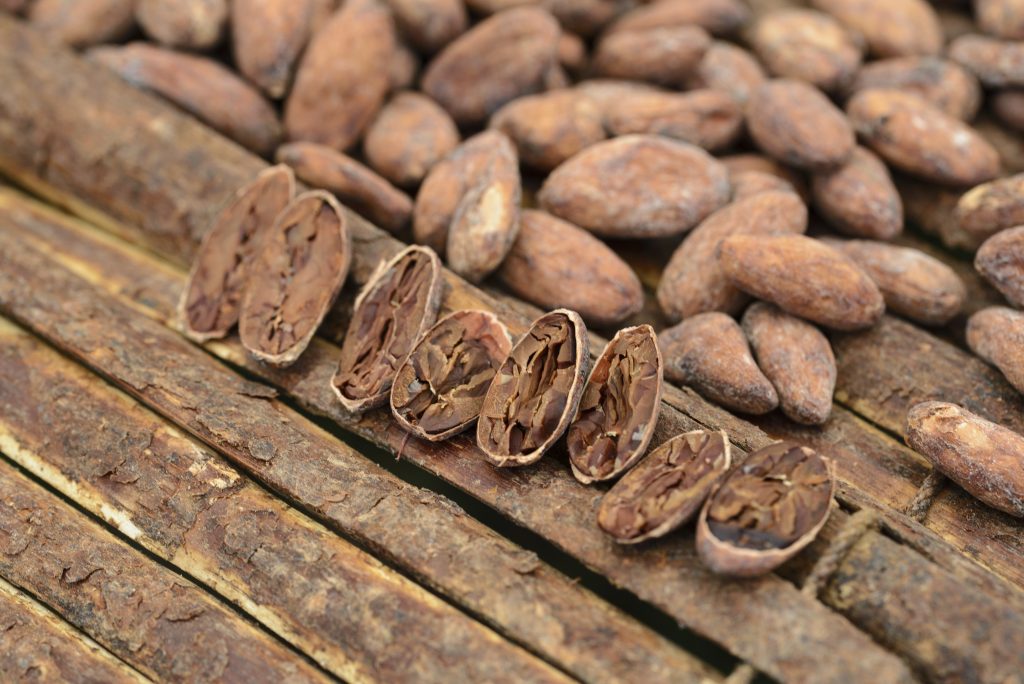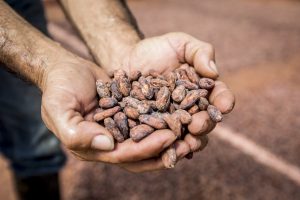By Juliana Splendore
In late summer of 2016, Emily Stone, the founder of Uncommon Cacao – an American supplier of specialty cacao beans to artisanal chocolate producers – travelled to Colombia for the first time to scout potential sustainable cacao producers. Her trip took her to two extreme corners of Colombia – the Sierra Nevada, a mountain range just 42 km away from the Caribbean coast, and Tumaco, on the southern reaches of Colombia’s hyper-rainy Pacific.
Getting a first-hand look was essential to Uncommon in order to start building relationships, verify quality and confirm the social and environmental impacts of the producers. In addition to aiming for high-quality beans Uncommon puts a premium on transparent trade, farmer prosperity and long-term relationships. This essential trip was facilitated by the Environmental Defense Fund and Canopy Bridge as part of a USAID grant that helps connect Indigenous Peoples and local community producers to buyers who want to support tropical forest conservation.
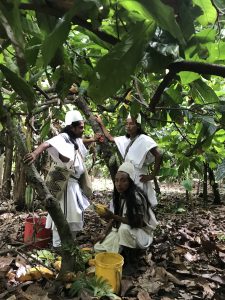
The results of this trip: in early 2017 Uncommon Cacao bought nearly $75,000 worth of raw cacao beans from those communities. Sales were made through Cacao de Colombia, a Colombian company that has long-standing relationships with communities, working with them to improve quality and sustainability. Because of the special quality of the cacao and the social impact generated, Uncommon Cacao is paying nearly three times the price of the regular market. Among potential buyers in the USA is Dandelion, a famous “bean to bar” chocolate maker in San Francisco.
Cacao is considered as a “forest friendly” product, since it is generally cultivated under the shade of native canopy trees, especially in those two communities, and provides a source of livelihood from intensive agriculture instead of illegal logging, deforestation or illicit crops.
One of the suppliers is the Arhuaco indigenous community, from Sierra Nevada de Santa Marta (Caribbean coast). Their cacao production has been supported by USAID, the Colombian government and a United Nations program promoting alternatives to growing illegal coca for drug production.
The variety of cacao produced in Sierra Nevada has a unique flavor profile, possibly enhanced by the indigenous producers’ techniques for the “spiritual cleansing of the fields,” according to Eliecer Arhuaco, the manager of cacao project.
Cacao de Colombia, Uncommon’s local sourcing partner has also been instrumental. They have been working with the Arhuaco communities since 2011 “from bean to bar,” including production of a chocolate bar (72% cacao) that won the gold prize at the International Chocolate Awards in London in 2015.
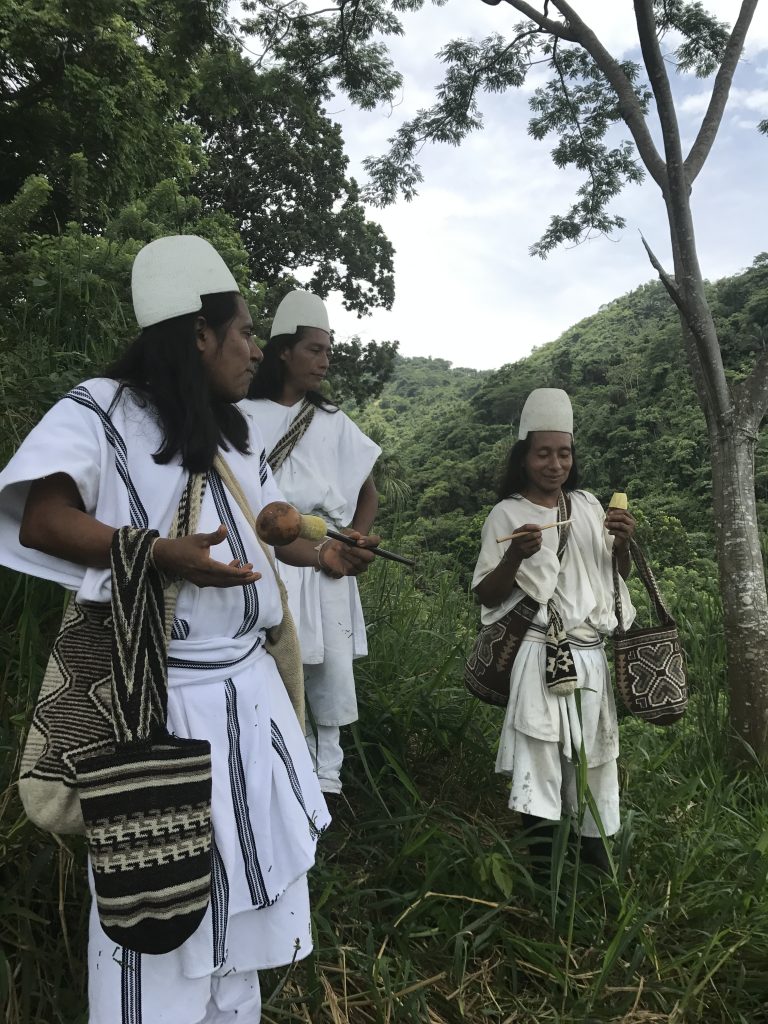
The largest share of Uncommon Cacao’s shipment is coming from Tumaco, on the Pacific coast of Colombia. EDF and Uncommon Cacao visited one of the three supplier communities from this region that work with Cacao de Colombia: Bajo Mira, a group of Afro-Colombian communities with collective title to 46,000 hectares of land in the forests of Tumaco.
Thanks to the support of international agencies such as USAID, this community has developed forest management plans combining a variety of sustainable forest products, and has even explored the carbon offset market. Most of the 50 tons they produce each year is recognized for its high quality and is used to produce fine and premium chocolate. Bajo Mira cacao has organic certification (CERES) and fair trade labels.
The cacao from Tumaco is a success story set against a history of violence and displacement suffered by the communities over years of armed conflict and drug trafficking. Tumaco communities have suffered deforestation and forest degradation as well as collateral damage from aerial spraying to eradicate coca (the plant used to produce cocaine, not be confused with cocoa or cacao, used for making chocolate). Recently, cacao producers in these communities have increased their income after they started receiving training and improving sales with cacao buyers such as Cacao de Colombia.
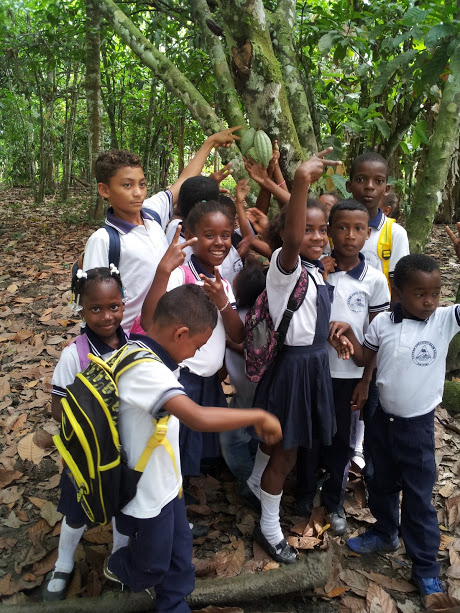
According to Stasi Baranoff, responsible for origin relationships (which ensure financial sustainability and quality of the products of the suppliers) at Uncommon Cacao, “the support from EDF and Canopy Bridge was critical. It allowed Uncommon to visit all of the regions we were interested in and build new connections.”
EDF and Canopy Bridge intend to keep building relations between indigenous peoples, local communities and companies that contribute to generate positive social and environmental impacts on the ground. Cacao is one good example of a forest friendly product, but there are others that can also be boosted by our projects in other forest regions in Latin America.
Juliana Splendore is a consultant at the Environmental Defense Fund. She has a Master’s in Latin American Studies at the Sorbonne University and has worked more than seven years on climate change and indigenous issues.
